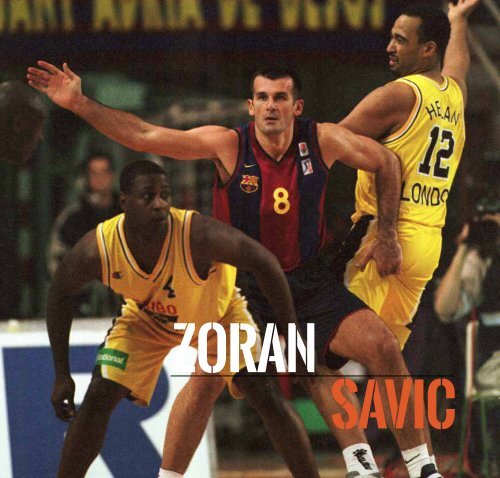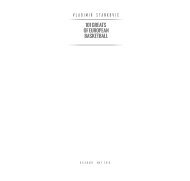ZORAN SAVIC - 101 Greats of European Basketball
Create successful ePaper yourself
Turn your PDF publications into a flip-book with our unique Google optimized e-Paper software.
Zoran<br />
Savic<br />
315
The title collector<br />
During the 1988-89 season, the impeccable<br />
scouting <strong>of</strong> the great Jugoplastika<br />
team coached by Boza Maljkovic followed<br />
closely an unknown center who<br />
played in Celik Zenica <strong>of</strong> Bosnia-Herzegovina,<br />
on what was then a second-division<br />
team. The reports were positive and in the summer<br />
<strong>of</strong> 1989 the club from Split, the defending EuroLeague<br />
champion, announced the signing <strong>of</strong> one Zoran Savic,<br />
who was born on November 18, 1966, in Zenica. Savic<br />
was a center who was almost 23 years old, but few<br />
could have imagined that Jugoplastika had just made a<br />
great signing and even fewer that Yugoslav basketball<br />
had just added a new name to its list <strong>of</strong> greats.<br />
The first game <strong>of</strong> the 1989-90 Yugoslav League,<br />
which I saw on TV, had Jugoplastika as the visiting<br />
team, I don’t remember against whom, but perhaps<br />
Cibona Zagreb. What I do remember, however, was that<br />
alongside those great players that had surprisingly<br />
won the <strong>European</strong> crown in Munich the previous season<br />
– Toni Kukoc, Dino Radja, Dusko Ivanovic, Velimir<br />
Perasovic, Luka Pavicevic, Zoran Sretenovic and Goran<br />
Sobin – a rookie wearing number 13 stood out. Defensive<br />
rebound, two points, <strong>of</strong>fensive rebound, assists,<br />
another rebound, fastbreak, foul drawn, free throw<br />
made. As Bogdan Tanjevic perfectly defines it: “Talent<br />
is like a shorter leg. You can see it right away.”<br />
That’s how Zoran Savic started his career, in style.<br />
He was not a young talent who had starred on youth<br />
teams <strong>of</strong> a great club in the old Yugoslavia. In fact, until<br />
he was 16 years old, Savic didn’t even play basketball.<br />
His path was slow, with obstacles, and most <strong>of</strong> all, with<br />
lots <strong>of</strong> hard work. At that age, he was sent on loan to Capljina<br />
Borac where he played with Jasmin Repesa – with<br />
whom he later won the Italian League title at Fortitudo<br />
Bologna. But life was fair to Savic. His great will to work<br />
paid <strong>of</strong>f with the chance given to him by Maljkovic – and<br />
Savic used it. In his first season playing elite basketball,<br />
he played more like a veteran than a rookie. The first<br />
title arrived in February, when Jugoplastika defeated<br />
Crvena Zvezda 79-77 in the Yugoslav Cup final played<br />
in Dubrovnik. On April 19, in Zaragoza, Jugoplastika<br />
won its second straight <strong>European</strong> crown by defeating<br />
FC Barcelona in the final 72-67 with 4 points and 7 rebounds<br />
from Savic. In May, Jugoplastika won its third<br />
straight Yugoslav League title and coach Dusan Ivkovic<br />
called Savic among the candidates for the Yugoslavia<br />
team at the 1990 World Cup in Argentina.<br />
A rookie world champion<br />
Against tradition and custom, Savic made his debut<br />
in the top national team at 24 years <strong>of</strong> age. He stayed<br />
with the team until he voluntarily retired after the 1997<br />
EuroBasket in Barcelona. Yugoslavia, first as a united<br />
country including all its regions, and later in a reduced<br />
version only with Serbia and Montenegro, always had<br />
talented players with world fame like Drazen Petrovic,<br />
Vlade Divac, Toni Kukoc, Sasha Djordjevic, Predrag<br />
Danilovic, Zarko Paspalj or Dejan Bodiroga. But in all its<br />
schemes and systems, first with Coach Ivkovic and later<br />
with Zeljko Obradovic, there was a key piece: Zoran<br />
Savic.<br />
Year after year, Savic improved his technique and<br />
his physical strength, and with a great work ethic he became<br />
a very useful player. He lacked height, but he had<br />
everything else: rebounds, good shooting, assists and<br />
<strong>101</strong> greats <strong>of</strong> european basketball<br />
Zoran Savic<br />
S
Vladimir Stankovic<br />
broad shoulders to keep taller, stronger opponents at<br />
bay. Also, he was very smart, because he understood<br />
the game like few big men. He came back from Buenos<br />
Aires in 1990 as a world champion, having averaged 8.6<br />
points and 2.7 boards. He was the fourth-best scorer<br />
on a very powerful team, after Petrovic (18.4), Kukoc<br />
(16.5) and Paspalj (13.0), but ahead <strong>of</strong> Divac (8.2). In the<br />
semifinals against a good Team USA, playing against<br />
Alonzo Mourning, Savic scored 14 points and added 5<br />
rebounds.<br />
Half a year later, on April 18, 1991, in Paris, Jugoplastika<br />
won its third straight continental final, once<br />
again beating FC Barcelona, which was now coached<br />
by Maljkovic. The Split team, with Zeljko Pavlicevic now<br />
at the helm, won by the score <strong>of</strong> 70-65. The MVP <strong>of</strong><br />
the tourney was Kukoc, but the man <strong>of</strong> the final was<br />
Savic, who scored 27 points and added 4 rebounds.<br />
That’s still the scoring record <strong>of</strong> a Final Four championship<br />
game, shared with a few other players. In the<br />
summer <strong>of</strong> that year, at the 1991 EuroBasket in Rome,<br />
Savic won the gold medal with a complete Yugoslavia<br />
for the last time (even though Slovenian Jure Zdovc<br />
had to leave the team before the semifinals). With the<br />
start <strong>of</strong> the war in Yugoslavia, Savic left Split and in<br />
October <strong>of</strong> 1991 signed for FC Barcelona. Two years<br />
later he moved to Greece to play with PAOK Thessaloniki.<br />
Those are the “empty” years <strong>of</strong> his career, as he<br />
did not add any titles. With PAOK, in 1994, he won his<br />
third <strong>European</strong> trophy, the Korac Cup, after two wins<br />
over Stefanel Trieste. In the game in Thessaloniki,<br />
a 75-66 victory, Savic contributed 15 points and 10<br />
boards while in Trieste, a 100-91 win, he had 8 points<br />
and 2 rebounds. In his second PAOK season, Savic<br />
won the Greek Cup. Due to international sanctions, he<br />
could not play at the 1992 Olympics in Barcelona with<br />
Yugoslavia, the 1993 EuroBasket in Germany or the<br />
1994 World Cup in Toronto.<br />
Success in 19 <strong>of</strong> 21 finals<br />
Yugoslavia was back for the 1995 EuroBasket in<br />
Athens and was back in style: taking the gold in an<br />
unforgettable title game victory, 96-90 against a Lithuania<br />
team with Arvydas Sabonis, Sarunas Marculionis,<br />
Rimas Kurtinaitis, Valdemaras Chomicius and Arturas<br />
Karnisovas. On the other side were Divac, Bodiroga,<br />
Djordjevic (41 points, 9 <strong>of</strong> 12 threes), Danilovic, Paspalj,<br />
Dejan Tomasevic and Savic. For the tournament, Savic<br />
averaged 11 points and 4 rebounds.<br />
After his great tournament, Zeljko Obradovic, the<br />
national team coach, took Savic to Real Madrid with<br />
him. He played a solid season (16.4 ppg) but in the 1996<br />
Final Four in Paris, Real Madrid lost to FC Barcelona in<br />
the semifinals. Savic’s next stop was Italy as he signed<br />
for Kinder Bologna under Ettore Messina. In the summer<br />
<strong>of</strong> 1996, Savic took a silver medal with Yugoslavia<br />
at the Atlanta Olympics, but he missed the title game<br />
against the USA due to a twisted ankle from the semis<br />
against Lithuania.<br />
Savic’s first year in Bologna ended up blank, but<br />
he found some consolation at the 1997 EuroBasket in<br />
Barcelona as Yugoslavia won the gold medal, Savic’s<br />
sixth, to go with an Olympic silver, plus a Korac Cup and<br />
a Greek Cup. In the 1997-98 season, he won the triple<br />
crown: EuroLeague, Italian League and Italian Cup with<br />
Kinder. He won his third <strong>European</strong> crown at Palau Sant<br />
Jordi in Barcelona, just where he had started his international<br />
career years earlier. He played alongside Danilovic,<br />
Augusto Binelli, Hugo Sconochini, Alessandro<br />
Abbio and Radoslav Nesterovic to defeat AEK Athens in<br />
316<br />
317
etired, the numbers said the between clubs and the<br />
national team, he had won 19 <strong>of</strong> the 21 finals he played,<br />
a rate <strong>of</strong> 90.5%! Indeed, Savic was a title collector. If we<br />
add in two Yugoslav Supercups he has 20 titles and an<br />
Olympic medal, though “only” a silver.<br />
After his great career as a player, Savic worked as<br />
the general manager <strong>of</strong> Fortitudo Bologna from 2002<br />
to 2005, reaching the 2004 EuroLeague title game and<br />
winning the 2005 Italian League alongside head coach<br />
Jasmin Repesa, his old teammate at Capljina. Savic held<br />
the same position at FC Barcelona later, when the club<br />
won a Spanish King’s Cup title and reached the 2006<br />
EuroLeague Final Four in Prague. Since 2010, he is a<br />
founding member and owner <strong>of</strong> the Invictus Sports<br />
Group, representing players and some coaches like<br />
Xavi Pascual, Simone Pianigiani and Zan Tabak.<br />
Zoran Savic<br />
the final 58-44, after which Savic was chosen MVP. His<br />
trophy collection had reached the double figures.<br />
Later in 1998, Savic started his Turkish adventure,<br />
signing with an ambitious Efes Pilsen, but a serious injury<br />
had him sidelined most <strong>of</strong> that year. Despite that,<br />
he added a new title, that country’s President’s Cup. In<br />
the 2000-01 season, at 34 years old, Savic went back<br />
to Barcelona and won the Spanish King’s Cup plus the<br />
Spanish League. He played one more year in Bologna,<br />
this time on the other side, with Fortitudo. When he<br />
<strong>101</strong> greats <strong>of</strong> european basketball<br />
S

















